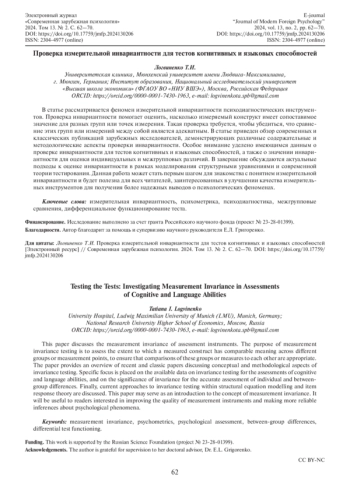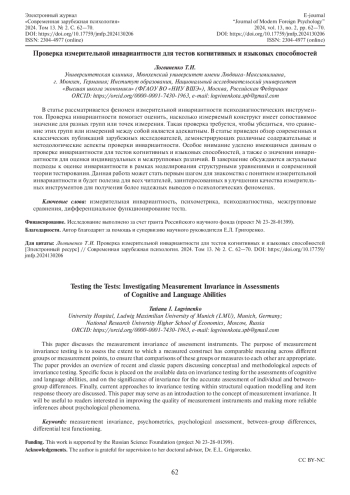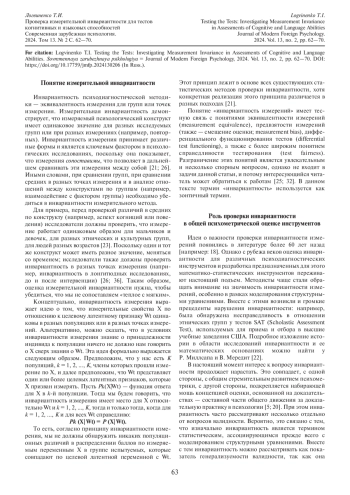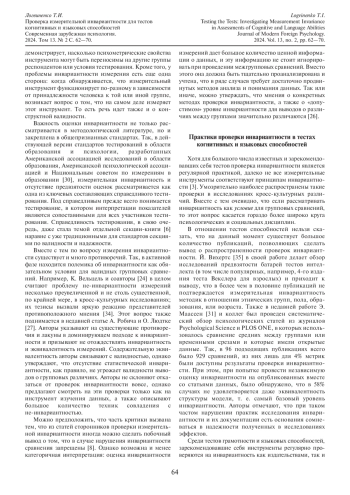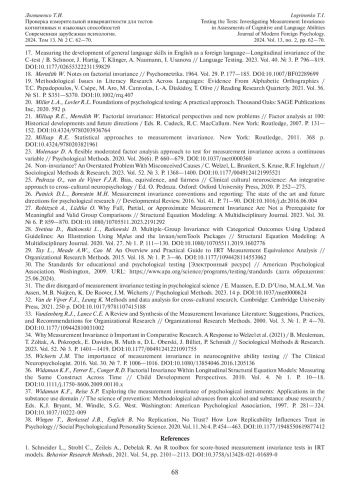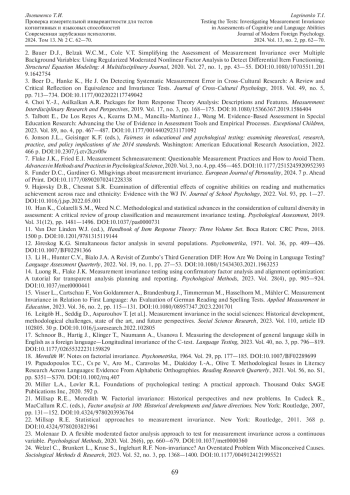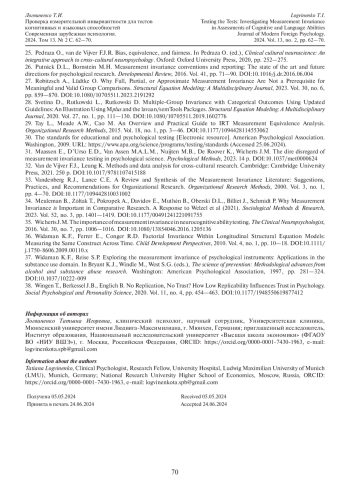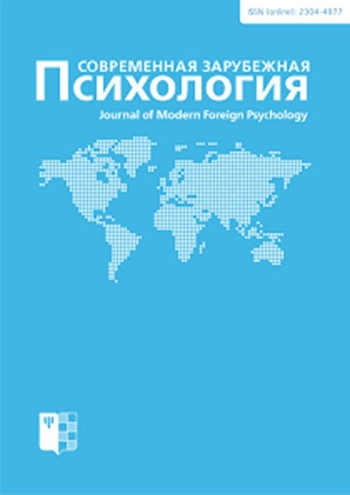В статье рассматривается феномен измерительной инвариантности психодиагностических инструментов. Проверка инвариантности помогает оценить, насколько измеряемый конструкт имеет сопоставимое значение для разных групп или точек измерения. Такая проверка требуется, чтобы убедиться, что сравнение этих групп или измерений между собой является адекватным. В статье приведен обзор современных и классических публикаций зарубежных исследователей, демонстрирующих различные содержательные и методологические аспекты проверки инвариантности. Особое внимание уделено имеющимся данным о проверке инвариантности для тестов когнитивных и языковых способностей, а также о значении инвариантности для оценки индивидуальных и межгрупповых различий. В завершение обсуждаются актуальные подходы к оценке инвариантности в рамках моделирования структурными уравнениями и современной теории тестирования. Данная работа может стать первым шагом для знакомства с понятием измерительной инвариантности и будет полезна для всех читателей, заинтересованных в улучшении качества измерительных инструментов для получения более надежных выводов о психологических феноменах.
Идентификаторы и классификаторы
- Префикс DOI
- 10.17759/jmfp.2024130206
- eLIBRARY ID
- 68520283
Идеи о важности проверки инвариантности измерений появились в литературе более 60 лет назад [например: 18]. Однако с рубежа веков оценка инвариантности для различных психодиагностических инструментов и разработка предназначенных для этого математико-статистических инструментов переживают настоящий подъем.
Список литературы
1. An R toolbox for score-based measurement invariance tests in IRT models / L. Schneider, C. Strobl, A. Zeileis, R. Debelak // Behavior Research Methods. 2021. Vol. 54. P. 2101-2113. DOI: 10.3758/s13428-021-01689-0 EDN: BJCZJJ
2. Bauer D.J., Belzak W.C.M., Cole V.T. Simplifying the Assessment of Measurement Invariance over Multiple Background Variables: Using Regularized Moderated Nonlinear Factor Analysis to Detect Differential Item Functioning // Structural Equation Modeling: A Multidisciplinary Journal. 2020. Vol. 27. № 1. P. 43-55. DOI: 10.1080/10705511.2019.1642754
3. Boer D., Hanke K., He J. On Detecting Systematic Measurement Error in Cross-Cultural Research: A Review and Critical Reflection on Equivalence and Invariance Tests // Journal of Cross-Cultural Psychology. 2018. Vol. 49. № 5. P. 713-734. DOI: 10.1177/0022022117749042 EDN: VGWPRL
4. Choi Y.-J., Asilkalkan A.R. Packages for Item Response Theory Analysis: Descriptions and Features // Measurement: Interdisciplinary Research and Perspectives. 2019. Vol. 17. № 3. P. 168-175. DOI: 10.1080/15366367.2019.1586404
5. Evidence-Based Assessment in Special Education Research: Advancing the Use of Evidence in Assessment Tools and Empirical Processes / E. Talbott, A. De Los Reyes, D.M. Kearns, J. Mancilla-Martinez, M. Wang // Exceptional Children. 2023. Vol. 89. № 4. P. 467-487. DOI: 10.1177/00144029231171092 EDN: JUKXJW
6. Fairness in educational and psychological testing: examining theoretical, research, practice, and policy implications of the 2014 standards / Eds. J.L. Jonson, K.F. Geisinger. Washington: American Educational Research Association, 2022. 466 p. DOI: 10.2307/j.ctv2kzv0fw
7. Flake J.K., Fried E.I. Measurement Schmeasurement: Questionable Measurement Practices and How to Avoid Them // Advances in Methods and Practices in Psychological Science. 2020. Vol. 3. № 4. P. 456-465. DOI: 10.1177/2515245920952393 EDN: TZJBLI
8. Funder D.C., Gardiner G. MIsgivings about measurement invariance // European Journal of Personality. 2024. 7 p. Ahead of Print. DOI: 10.1177/08902070241228338 EDN: YHOCUW
9. Hajovsky D.B., Chesnut S.R. Examination of differential effects of cognitive abilities on reading and mathematics achievement across race and ethnicity: Evidence with the WJ IV // Journal of School Psychology. 2022. Vol. 93. P. 1-27. DOI: 10.1016/j.jsp.2022.05.001 EDN: CBDYKM
10. Han K., Colarelli S.M., Weed N.C. Methodological and statistical advances in the consideration of cultural diversity in assessment: A critical review of group classification and measurement invariance testing // Psychological Assessment. 2019. Vol. 31(12). P. 1481-1496. DOI: 10.1037/pas0000731 EDN: ELRRUM
11. Handbook of Item Response Theory: Three Volume Set / Ed. W.J. Van Der Linden. Boca Raton: CRC Press, 2018. 1500 p. DOI: 10.1201/9781315119144
12. Jöreskog K.G. Simultaneous factor analysis in several populations // Psychometrika. 1971. Vol. 36. P. 409-426. DOI: 10.1007/BF02291366 EDN: YCNNDL
13. Li H., Hunter C.V., Bialo J.A. A Revisit of Zumbo’s Third Generation DIF: How Are We Doing in Language Testing? // Language Assessment Quarterly. 2022. Vol. 19. № 1. P. 27-53. DOI: 10.1080/15434303.2021.1963253 EDN: SBYCZG
14. Luong R., Flake J.K. Measurement invariance testing using confirmatory factor analysis and alignment optimization: A tutorial for transparent analysis planning and reporting // Psychological Methods. 2023. Vol. 28(4). P. 905-924. DOI: 10.1037/met0000441 EDN: TQHSAW
15. Measurement Invariance in Relation to First Language: An Evaluation of German Reading and Spelling Tests / L. Visser, F. Cartschau, A. Von Goldammer, J. Brandenburg, M. Timmerman, M. Hasselhorn, C. Mähler // Applied Measurement in Education. 2023. Vol. 36. № 2. P. 115-131. DOI: 10.1080/08957347.2023.2201701 EDN: OUALOK
16. Measurement invariance in the social sciences: Historical development, methodological challenges, state of the art, and future perspectives / H. Leitgöb, D. Seddig, T. Asparouhov (et al.) // Social Science Research. 2023. Vol. 110. Article ID 102805. 30 p. DOI: 10.1016/j.ssresearch.2022.102805 EDN: GPVOVD
17. Measuring the development of general language skills in English as a foreign language-Longitudinal invariance of the C-test / B. Schnoor, J. Hartig, T. Klinger, A. Naumann, I. Usanova // Language Testing. 2023. Vol. 40. № 3. P. 796-819. DOI: 10.1177/02655322231159829 EDN: DDYRZM
18. Meredith W. Notes on factorial invariance // Psychometrika. 1964. Vol. 29. P. 177-185. DOI: 10.1007/BF02289699 EDN: IDYFNZ
19. Methodological Issues in Literacy Research Across Languages: Evidence From Alphabetic Orthographies / T.C. Papadopoulos, V. Csépe, M. Aro, M. Caravolas, I.-A. Diakidoy, T. Olive // Reading Research Quarterly. 2021. Vol. 56. № S1. P. S351-S370. DOI: 10.1002/rrq.407 EDN: QSMVJL
20. Miller L.A., Lovler R.L. Foundations of psychological testing: A practical approach. Thousand Oaks: SAGE Publications Inc, 2020. 592 p.
21. Millsap R.E., Meredith W. Factorial invariance: Historical perspectives and new problems // Factor analysis at 100: Historical developments and future directions / Eds. R. Cudeck, R.C. MacCallum. New York: Routledge, 2007. P. 131-152. DOI: 10.4324/9780203936764
22. Millsap R.E. Statistical approaches to measurement invariance. New York: Routledge, 2011. 368 p. DOI: 10.4324/9780203821961
23. Molenaar D. A flexible moderated factor analysis approach to test for measurement invariance across a continuous variable // Psychological Methods. 2020. Vol. 26(6). P. 660-679. DOI: 10.1037/met0000360 EDN: CXAUKC
24. Non-invariance? An Overstated Problem With Misconceived Causes / C. Welzel, L. Brunkert, S. Kruse, R.F. Inglehart // Sociological Methods & Research. 2023. Vol. 52. № 3. P. 1368-1400. DOI: 10.1177/0049124121995521 EDN: ULUZMM
25. Pedraza O., van de Vijver F.J.R. Bias, equivalence, and fairness // Clinical cultural neuroscience: An integrative approach to cross-cultural neuropsychology / Ed. O. Pedraza. Oxford: Oxford University Press, 2020. P. 252-275.
26. Putnick D.L., Bornstein M.H. Measurement invariance conventions and reporting: The state of the art and future directions for psychological research // Developmental Review. 2016. Vol. 41. P. 71-90. DOI: 10.1016/j.dr.2016.06.004 EDN: XTXJXH
27. Robitzsch A., Lüdtke O. Why Full, Partial, or Approximate Measurement Invariance Are Not a Prerequisite for Meaningful and Valid Group Comparisons // Structural Equation Modeling: A Multidisciplinary Journal. 2023. Vol. 30. № 6. P. 859-870. DOI: 10.1080/10705511.2023.2191292 EDN: FNLXVL
28. Svetina D., Rutkowski L., Rutkowski D. Multiple-Group Invariance with Categorical Outcomes Using Updated Guidelines: An Illustration Using Mplus and the lavaan/semTools Packages // Structural Equation Modeling: A Multidisciplinary Journal. 2020. Vol. 27. № 1. P. 111-130. DOI: 10.1080/10705511.2019.1602776
29. Tay L., Meade A.W., Cao M. An Overview and Practical Guide to IRT Measurement Equivalence Analysis // Organizational Research Methods. 2015. Vol. 18. № 1. P. 3-46. DOI: 10.1177/1094428114553062
30. The Standards for educational and psychological testing [Электронный ресурс] // American Psychological Association. Washington, 2009. URL: https://www.apa.org/science/programs/testing/standards (дата обращения: 25.06.2024).
31. The dire disregard of measurement invariance testing in psychological science / E. Maassen, E.D. D’Urso, M.A.L.M. Van Assen, M.B. Nuijten, K. De Roover, J.M. Wicherts // Psychological Methods. 2023. 14 p. DOI: 10.1037/met0000624 EDN: WAOUCI
32. Van de Vijver F.J., Leung K. Methods and data analysis for cross-cultural research. Cambridge: Cambridge University Press, 2021. 250 p. DOI: 10.1017/9781107415188
33. Vandenberg R.J., Lance C.E. A Review and Synthesis of the Measurement Invariance Literature: Suggestions, Practices, and Recommendations for Organizational Research // Organizational Research Methods. 2000. Vol. 3. № 1. P. 4-70. DOI: 10.1177/109442810031002 EDN: JOPGWD
34. Why Measurement Invariance is Important in Comparative Research. A Response to Welzel et al. (2021) / B. Meuleman, T. Żółtak, A. Pokropek, E. Davidov, B. Muthén, D.L. Oberski, J. Billiet, P. Schmidt // Sociological Methods & Research. 2023. Vol. 52. № 3. P. 1401-1419. DOI: 10.1177/00491241221091755 EDN: HDRJYH
35. Wicherts J.M. The importance of measurement invariance in neurocognitive ability testing // The Clinical Neuropsychologist. 2016. Vol. 30. № 7. P. 1006-1016. DOI: 10.1080/13854046.2016.1205136
36. Widaman K.F., Ferrer E., Conger R.D. Factorial Invariance Within Longitudinal Structural Equation Models: Measuring the Same Construct Across Time // Child Development Perspectives. 2010. Vol. 4. № 1. P. 10-18. DOI: 10.1111/j.1750-8606.2009.00110.x
37. Widaman K.F., Reise S.P. Exploring the measurement invariance of psychological instruments: Applications in the substance use domain // The science of prevention: Methodological advances from alcohol and substance abuse research / Eds. K.J. Bryant, M. Windle, S.G. West. Washington: American Psychological Association, 1997. P. 281-324. DOI: 10.1037/10222-009
38. Wingen T., Berkessel J.B., Englich B. No Replication, No Trust? How Low Replicability Influences Trust in Psychology // Social Psychological and Personality Science. 2020. Vol. 11. № 4. P. 454-463. DOI: 10.1177/1948550619877412
Выпуск
Другие статьи выпуска
В статье представлен обзор ряда современных зарубежных исследований имплицитного понимания неверных мнений (implicit false beliefs) у детей раннего возраста при типичном развитии, нарушениях слуха, расстройствах аутистического спектра, а также у приматов. Проанализированы результаты исследований, выполненных с использованием разных методологических парадигм оценки раннего развития модели психического: «нарушение ожиданий» (violation of expectations) и «предвосхищающий взгляд» (anticipatory looking). Представлены результаты исследований поиска биологических основ истоков социального познания с применением ближней инфракрасной спектрометрии (functional near-infrared spectroscopy), а также результаты исследований взаимосвязи возможных предикторов модели психического (понимания целенаправленности действий другого, совместного внимания, имплицитного понимания неверных мнений) и успешности социального познания в дошкольном возрасте при типичном развитии. Описываются теоретические представления о двух системах модели психического: минимальной и собственно модели психического. Обозначены ближайшие перспективы будущих исследований, позволяющие разрешить существующие кризисы репликации и не допустить новых.
В статье представлен обзор театральных практик, направленных на диагностику, профилактику и коррекцию поведения подростков, склонных к рискам, посредством развития эмоционального интеллекта, метапредметных компетенций, чувства ответственности и осознанности. Проанализированы различия и сходства в применении театральных практик за рубежом и на территории России в работе с трудными подростками. Обосновано применение театральных практик при учете возрастных потребностей подростков. Приведена характеристика наиболее востребованных театральных практик в мире - форум-тетра, плэйбэк-театра, популярного, социального театра. Обозначены различия между театральными практиками, нацеленными на процесс создания спектакля, и практиками, направленными на создание продукта - спектакля. Приведен анализ эмпирических исследований в контексте сопоставления видов театральных практик и достигаемых результатов в работе с подростками, склонными к риску или относящимися к группе риска. На примере «Мультимедиа-театра» обоснована актуальность разработки и применения инструментов театральной педагогики для решения проблем современных подростков (в том числе и методом ролевого экспериментирования).
В статье представлен опыт изучения интернализированных расстройств у детей и подростков исследователями западных и восточных стран: США, Канады, Великобритании, Германии, Польши, Китая и др. Это позволило представить более обширную географию стран, которые в своей психиатрической практике и психологической науке применяют диагностическую парадигму, опираясь на трансдиагностическую модель классификации психических расстройств. Автором предпринята попытка рассмотреть различные подходы к изучению вопросов, связанных с интернализированными расстройствами зарубежными исследователями. В статье представлены понятие «интернализированные расстройства», его противопоставление понятию «экстернализированные расстройства». Особое внимание уделено симптомам, диагностике, интервенции интернализированных расстройств именно в детском и подростковом возрасте. Представлены данные об эпидемиологии и этиологии интернализированных расстройств у детей и подростков. Проведен анализ превалентности интернализированных расстройств среди детей и подростков, который варьируется в зависимости от возрастной группы, пола и региона проживания. Описываются некоторые исследования, касающиеся коморбидности интернализированных расстройств у детей и подростков. Материалы статьи позволяют получить более полное представление о сути феномена «интернализированные расстройства» и его ключевых характеристиках. Данные, представленные в статье, могут быть использованы для разработки эффективных подходов к стратегиям диагностики интернализированных расстройств и эффективных способов вмешательств в детском и подростковом возрасте в отечественной науке и практике.
Синдром дефицита внимания и гиперактивности (СДВГ) - широко распространенное расстройство развития, характеризующееся невнимательностью, импульсивностью и гиперактивностью. В то время как традиционные методы диагностики основаны на клинических интервью, тестах и поведенческих наблюдениях, методы машинного обучения (МО) дают возможность упростить процесс диагностики СДВГ и сделать его более точным. В данном обзоре предпринята попытка изучить опубликованную за последние несколько лет литературу, описывающую результаты применения алгоритмов машинного обучения к физиологическим и нейроанатомическим данным: снимкам и записям магнитно-резонансной томографии (МРТ), функциональной МРТ (фМРТ), инфракрасной спектроскопии (fNIRS), электроэнцефалографии (ЭЭГ), магнитоэнцефалографии (МЭГ), электрокардиограммы (ЭКГ), движений глаз и физической активности, а также параметров зрачков для выявления диагностических биомаркеров СДВГ. Модели глубокого обучения и алгоритм опорных векторов (SVM) демонстрируют наиболее перспективные результаты для выявления СДВГ, как у детей, так и у взрослых. Однако, несмотря на то, что с помощью методов машинного обучения исследователям удается достичь высокого уровня специфичности и чувствительности при решении задачи диагностики СДВГ, их использование в клинической практике требует предварительной работы для проверки результатов на больших выборках.
Долгое время считалось, что владение несколькими языками способствует более эффективному развитию исполнительных функций. Данное положение эмпирически подтверждалось в исследованиях, где билингвы противопоставлялись монолингвам в заданиях на ингибиторный контроль, когнитивную гибкость, рабочую память, внимание. Однако опубликованные в последние годы систематические обзоры и мета-анализы ставят под сомнение существование подобного «билингвального преимущества». Предполагается, что источником неоднородности результатов могут являться не полученные данные, а, скорее, концептуальные методологические парадигмы, используемые научными группами при проведении исследований. Цель данного обзора заключается в анализе современных зарубежных работ на предмет актуальных подходов к операционализации билингвального опыта и исполнительных функций. В обзоре также критически рассматриваются теории «билингвального преимущества» и особенности инструментов оценки исполнительных функций. Основной вывод состоит в необходимости более тщательно разрабатывать дизайны будущих исследований с учетом индивидуальных особенностей билингвов, а также специфики заданий на оценку исполнительных функций. Также возникает необходимость в новых фальсифицируемых теориях, которые предлагали бы априорно проверяемые гипотезы. В заключение описываются ключе
Статистика статьи
Статистика просмотров за 2025 - 2026 год.
Издательство
- Издательство
- МГППУ
- Регион
- Россия, Москва
- Почтовый адрес
- 127051, Россия, Центральный федеральный округ, Москва, улица Сретенка, дом 29
- Юр. адрес
- 127051, Россия, Центральный федеральный округ, Москва, улица Сретенка, дом 29
- ФИО
- Марголис Аркадий Аронович (РЕКТОР)
- E-mail адрес
- margolisaa@mgppu.ru
- Контактный телефон
- +7 (495) 6329202
- Сайт
- https://mgppu.ru/
